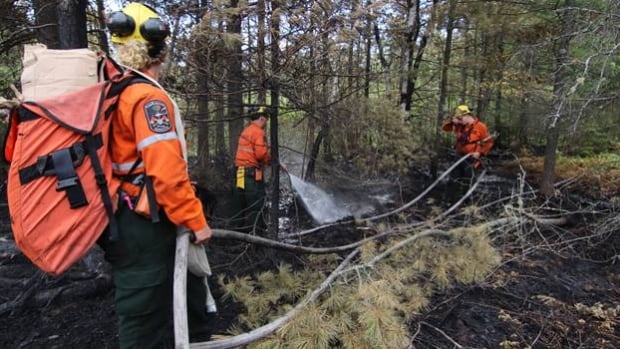
The union representing Ontario’s forest firefighters wants their job titles reclassified, which they say could result in higher pay and bolster recruitment and retention among their ranks.
Noah Freedman, a fire crew leader and vice-president of OPSEU Local 703, said the province currently classifies forest firefighters as resource technicians.
He said that role doesn’t properly recognize the dangerous work forest firefighters do and the time away from their families, or allow them to recruit and train young firefighters for the long term.
“If the government were to reclassify us as wildland firefighters, then we would be compensated appropriately for the dangers we face, and toxins we breathe and the sacrifices we make,” he said.
The starting pay for resource technicians in Ontario is currently $25 an hour.
Freedman said a reclassification is sorely needed.
“Ontario is short almost 25 per cent of its wildland firefighters because of a retention crisis that’s been ongoing for years,” he said.
The province, however, says it has hired about 600 forest firefighters this year, although it has the budget to hire up to 800, and maintains it’s satisfied with the recruitment efforts this year.
The dangers faced by forest firefighters and retention issues aren’t unique to Ontario. In B.C., for example, it’s become a struggle to retain experienced workers during longer and harsher fire seasons.
In Ontario, NDP MPP Guy Bourgouin has also been calling for the province to reclassify forest firefighters.
“If we are going to attract people and keep them in the forest fire employment, we need to pay them more adequately and recognize the work they do because this is not easy work.”
Review underway
In an email to CBC News Caroline Mulroney, president of the Treasury Board, said an organizational review of firefighting classification by the Ontario Public Service is underway and it “would be inappropriate to comment further.” No timeline for the review was provided.
In April, the province said it would give wildland firefighters the same cancer, heart and post-traumatic stress disorder coverage as municipal firefighters, and expand presumptive coverage for skin cancer.
Legislation to improve the health and occupational safety benefits reached second reading in May and has been referred to the standing committee.
Freedman said better health benefits are a good start, but higher pay will attract more people to the job.
“While it’s very beneficial for folks who are currently in the job and those who have left, young 18-, 19 year-olds who are joining the job aren’t necessarily thinking about their health as much as the fact that the compensation is not adequate for all the sacrifices that we have to make.”